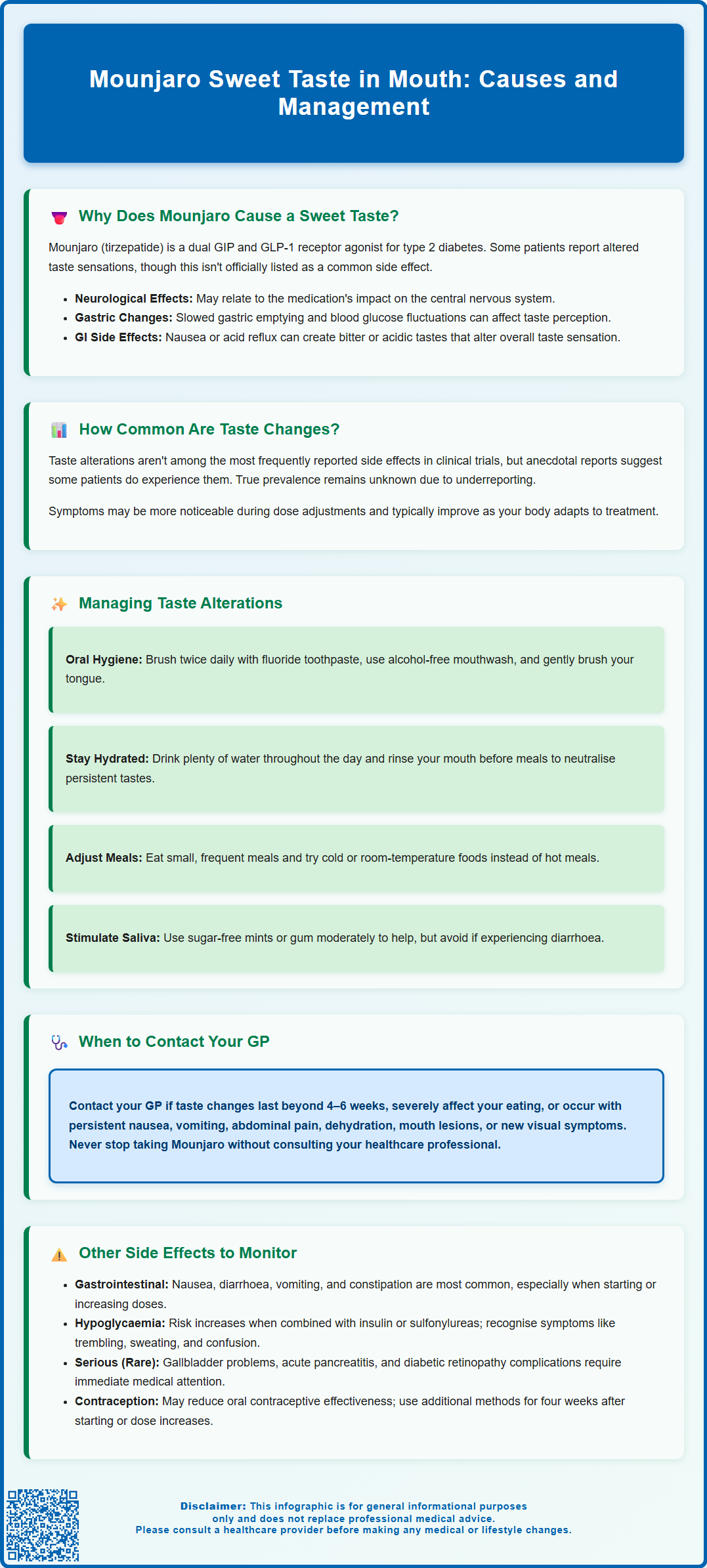Mounjaro (tirzepatide) is a dual GIP and GLP-1 receptor agonist licensed in the UK for treating type 2 diabetes mellitus. Whilst gastrointestinal symptoms are well-documented side effects, some patients report experiencing a sweet taste in the mouth during treatment. Although dysgeusia (altered taste sensation) is not specifically listed in the official Summary of Product Characteristics, understanding this potential effect can help patients manage expectations and seek appropriate advice. This article explores why taste changes may occur with Mounjaro, how common they are, and when to seek medical review.
Summary: A sweet taste in the mouth with Mounjaro (tirzepatide) is an uncommon, self-limiting side effect not formally listed in the Summary of Product Characteristics but reported anecdotally in clinical practice.
- Mounjaro is a dual GIP and GLP-1 receptor agonist licensed in the UK for type 2 diabetes mellitus treatment
- The mechanism behind taste alterations remains unclear but may relate to effects on gastric emptying, blood glucose fluctuations, or gastrointestinal symptoms
- Taste changes are generally temporary and tend to resolve as the body adjusts to treatment
- Contact your GP if taste disturbances persist beyond 4–6 weeks, significantly affect nutrition, or are accompanied by concerning symptoms such as severe abdominal pain or oral lesions
Table of Contents
Why Does Mounjaro Cause a Sweet Taste in Your Mouth?
Mounjaro (tirzepatide) is a dual glucose-dependent insulinotropic polypeptide (GIP) and glucagon-like peptide-1 (GLP-1) receptor agonist licensed in the UK for the treatment of type 2 diabetes mellitus. Dysgeusia (altered taste sensation) is not specifically listed as an adverse effect in the official Summary of Product Characteristics (SmPC), though some patients report experiencing taste disturbances during treatment.
The precise mechanism behind taste alterations with Mounjaro remains unclear. Several hypotheses exist, though these are not definitively established. GLP-1 receptor agonists may influence taste perception through their effects on the central nervous system and gastrointestinal tract. These medications slow gastric emptying, which could potentially influence taste perception through complex physiological pathways. Additionally, fluctuations in blood glucose levels may affect taste perception in some individuals.
Another consideration is that gastrointestinal side effects such as nausea or reflux (which typically causes bitter or acidic taste) might contribute to altered taste sensations in some patients. It's also worth noting that other conditions such as oral thrush or dental problems can cause taste changes and should be ruled out if symptoms persist.
Taste disturbances, when they occur, are generally temporary and tend to resolve as the body adjusts to the medication. However, understanding these potential effects can help patients manage their expectations and seek appropriate advice when needed.
How Common Is Taste Change with Mounjaro Treatment?
Taste alterations are not classified among the most frequently reported adverse effects of Mounjaro in clinical trials or post-marketing surveillance data. The most common side effects documented by the Medicines and Healthcare products Regulatory Agency (MHRA) and in clinical studies include gastrointestinal symptoms such as nausea, diarrhoea, vomiting, constipation, and abdominal discomfort. These occur in a significant proportion of patients, particularly during dose escalation.
However, anecdotal reports from patients and healthcare professionals suggest that taste changes, including a sweet taste in the mouth, do occur in clinical practice. The true prevalence is difficult to quantify as these symptoms may not always be reported or documented systematically. Taste disturbances may also be underreported because patients might not associate them directly with their diabetes medication or may consider them too minor to mention.
Factors that might potentially influence taste changes include:
-
Dose adjustments – Sensory changes may be more noticeable when starting treatment or increasing the dose
-
Individual sensitivity – Some patients may be more susceptible to sensory side effects than others
-
Concurrent medications – Multiple medications might contribute to taste disturbances
-
Underlying health conditions – Pre-existing oral health issues or other medical conditions may need consideration
While taste changes have been reported with some other GLP-1 receptor agonists, each medication has its own specific side effect profile. Most patients who experience taste alterations find that symptoms are mild and tend to improve as treatment continues, though this observation is based on clinical experience rather than formal studies.

Managing Sweet Taste and Other Taste Alterations
If you experience a sweet or altered taste whilst taking Mounjaro, several practical strategies may help minimise discomfort and improve your quality of life during treatment. These measures are generally safe and can be implemented alongside your prescribed medication regimen.
Oral hygiene measures are particularly important. Maintaining excellent dental care can help reduce taste disturbances. Brush your teeth at least twice daily with fluoride toothpaste, and consider using an alcohol-free mouthwash to freshen your mouth without causing additional irritation. Some patients find that gently brushing the tongue helps remove any coating that may contribute to altered taste. Regular dental check-ups should be maintained to rule out any underlying oral health issues.
Dietary modifications can also prove beneficial:
-
Drink plenty of water throughout the day to stay well-hydrated and help flush the mouth
-
Occasionally use sugar-free mints or chew sugar-free gum to stimulate saliva production (though use these moderately if you experience diarrhoea)
-
Eat small, frequent meals rather than large portions to minimise gastrointestinal symptoms that may worsen taste changes
-
Avoid strongly flavoured or spicy foods if they exacerbate the unusual taste
-
Try cold or room-temperature foods, which may be better tolerated than hot meals
-
Rinse your mouth with water before eating to help neutralise any persistent taste
Timing considerations may help as well. Some patients find that taste disturbances are more pronounced at certain times. However, it's important to maintain your once-weekly injection schedule as prescribed and not alter the frequency of your Mounjaro doses without consulting your healthcare professional.
If taste alterations persist beyond the first few weeks of treatment or significantly affect your nutrition and quality of life, discuss this with your healthcare team. They may suggest adjusting your treatment plan or investigating other potential causes such as oral thrush or dental issues.
When to Contact Your GP About Taste Changes
Whilst taste alterations are generally benign and self-limiting, certain circumstances warrant medical review. It is important to distinguish between minor, expected side effects and symptoms that may indicate a more significant problem requiring clinical assessment.
You should contact your GP or diabetes specialist nurse if:
-
Taste changes persist beyond 4–6 weeks without improvement
-
The altered taste is severe enough to affect your appetite or nutritional intake significantly
-
You experience unintentional weight loss beyond what is expected with Mounjaro treatment
-
Taste disturbances are accompanied by other concerning symptoms such as persistent nausea, vomiting, or abdominal pain
-
You develop signs of dehydration (dark urine, dizziness, reduced urination)
-
You notice oral lesions, ulcers, or significant changes in your mouth or tongue
-
The taste change is accompanied by difficulty swallowing or breathing
-
You develop any new or worsening visual symptoms (as tirzepatide may affect diabetic retinopathy in some patients)
Seek urgent medical attention if you experience symptoms suggestive of serious adverse effects, including severe abdominal pain (which may indicate pancreatitis), signs of an allergic reaction (rash, swelling, difficulty breathing), or symptoms of thyroid problems (lump in the neck, hoarseness, difficulty swallowing). Call 999 immediately for severe allergic reactions affecting breathing.
It is also important to maintain regular diabetes monitoring appointments. Your healthcare team will assess your overall response to Mounjaro, including glycaemic control (HbA1c levels), weight changes, and tolerability. If taste disturbances or other side effects significantly impair your quality of life or adherence to treatment, your clinician may consider adjusting your dose or exploring alternative therapeutic options.
Never discontinue Mounjaro without consulting your healthcare professional, as abrupt cessation may affect your diabetes control. Your GP can provide individualised advice based on your complete medical history and current health status.
Other Side Effects of Mounjaro to Be Aware Of
Beyond taste alterations, Mounjaro is associated with a range of side effects that patients should be aware of when starting treatment. Understanding these potential adverse effects can help you recognise them early and seek appropriate management.
Gastrointestinal side effects are the most commonly reported and include:
-
Nausea – affects a significant proportion of patients, particularly during dose escalation
-
Diarrhoea – may be mild to moderate and usually improves with time
-
Vomiting – less common than nausea but can occur, especially at higher doses
-
Constipation – some patients experience reduced bowel movements
-
Abdominal pain or discomfort – typically mild but should be monitored
-
Reduced appetite – contributes to weight loss but may be excessive in some individuals
These gastrointestinal symptoms are generally most pronounced when initiating treatment or increasing the dose. The Mounjaro SmPC recommends gradual dose escalation to improve tolerability. Eating smaller, more frequent meals and staying well-hydrated can help minimise these effects.
Hypoglycaemia risk is relatively low with Mounjaro monotherapy due to its glucose-dependent mechanism of action. However, the risk increases when tirzepatide is used in combination with insulin or sulfonylureas. Patients should be educated about recognising hypoglycaemia symptoms (trembling, sweating, confusion, palpitations) and appropriate management strategies.
Other notable side effects include:
-
Injection site reactions (redness, itching, bruising)
-
Gallbladder problems – seek medical advice for right upper abdominal pain, fever or yellowing of the skin/eyes
-
Acute pancreatitis (rare but serious – characterised by severe, persistent abdominal pain)
-
Diabetic retinopathy complications – report any new or worsening visual symptoms promptly
Important safety information: Mounjaro may reduce the effectiveness of oral contraceptives, particularly after starting treatment or increasing the dose. Consider using non-oral or additional contraceptive methods for four weeks after these changes.
The MHRA continues to monitor the safety profile of Mounjaro. Patients and healthcare professionals are encouraged to report any suspected adverse effects through the Yellow Card scheme at https://yellowcard.mhra.gov.uk. Your diabetes care team will provide comprehensive counselling about side effects and arrange appropriate monitoring throughout your treatment journey.
Frequently Asked Questions
Is a sweet taste in the mouth a common side effect of Mounjaro?
A sweet taste is not classified among the most frequently reported side effects in clinical trials, though anecdotal reports suggest it does occur in some patients. The true prevalence is difficult to quantify as these symptoms may be underreported.
How long does the sweet taste from Mounjaro typically last?
Taste disturbances are generally temporary and tend to resolve as the body adjusts to the medication, typically within the first few weeks of treatment. If symptoms persist beyond 4–6 weeks, contact your GP for review.
What can I do to manage altered taste whilst taking Mounjaro?
Maintain excellent oral hygiene, stay well-hydrated, use sugar-free mints or gum moderately, eat small frequent meals, and rinse your mouth with water before eating. If symptoms persist or worsen, consult your healthcare team.
The health-related content published on this site is based on credible scientific sources and is periodically reviewed to ensure accuracy and relevance. Although we aim to reflect the most current medical knowledge, the material is meant for general education and awareness only.
The information on this site is not a substitute for professional medical advice. For any health concerns, please speak with a qualified medical professional. By using this information, you acknowledge responsibility for any decisions made and understand we are not liable for any consequences that may result.
Heading 1
Heading 2
Heading 3
Heading 4
Heading 5
Heading 6
Lorem ipsum dolor sit amet, consectetur adipiscing elit, sed do eiusmod tempor incididunt ut labore et dolore magna aliqua. Ut enim ad minim veniam, quis nostrud exercitation ullamco laboris nisi ut aliquip ex ea commodo consequat. Duis aute irure dolor in reprehenderit in voluptate velit esse cillum dolore eu fugiat nulla pariatur.
Block quote
Ordered list
- Item 1
- Item 2
- Item 3
Unordered list
- Item A
- Item B
- Item C
Bold text
Emphasis
Superscript
Subscript










